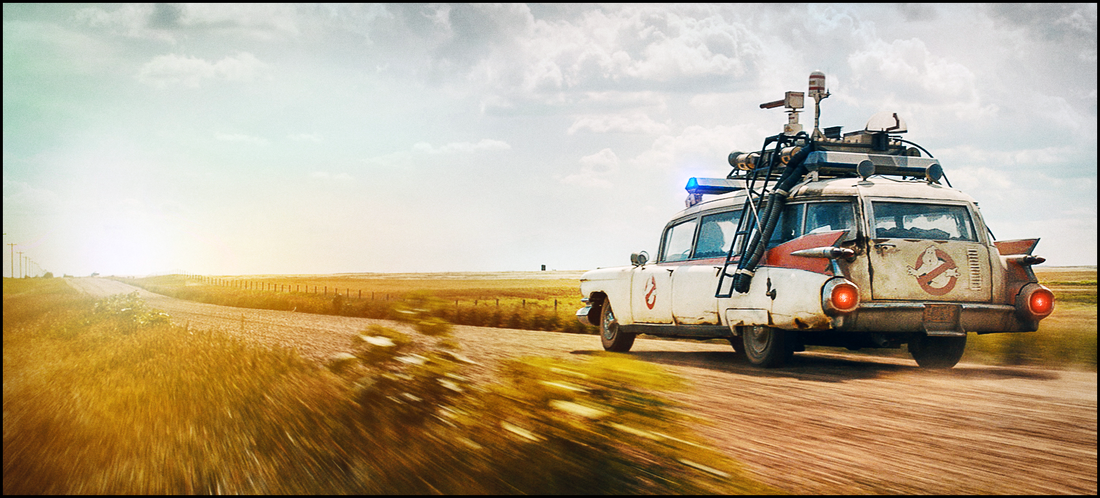Thankfully, those somewhat fearless four enjoyed a comeback – albeit briefly – in Ghostbusters: Afterlife, a flick the wifey and I managed to squeeze into our Black Friday schedule. As I saw this one all on my own – and not via any press screenings or freebies via distributor outlets – I won’t trouble this space with a full review … but I did want to post a few thoughts on the subject.
No, no, no: I’m not going to get into any discussion regarding the (thankfully) failed all-female Sony reboot from 2016. So far as this critic is concerned, Melissa McCarthy is the Antichrist, and the studios working overtime in their attempt to shove her down our collective throat as the next Julia Roberts deserve to lose more than they invest. She’s funny at about the intellectual level of the five-year-old, so keep at it, Hollywood!
What Afterlife got right may be a slim list, but it’s an important one.
First, it may’ve not perfectly done so, but it probably matched the tone of the original film about as well as any film could in this modern era.
See, we’ve grown a lot more jaded since the mid-80’s, and our society is vastly more toxic. Mimicking the charm of nearly four decades ago is exceedingly risky, but the screenwriting trio of Gil Kenan, Jason Reitman, and Dan Aykroyd hit all the right notes. Mckenna Grace (in a fabulous lead role as Phoebe, the late Egon Spengler’s granddaughter) hit most of the nerdy marks herself, and she did so while also being arguably one of the best representations of the quintessential American middle schooler to come out of Tinseltown since Stranger Things’ first and second seasons. Too often, directors and screenwriters just get ‘brilliant kid’ portrayals wrong (aka check out almost any episode of Wil Wheaton on Star Trek: The Next Generation); and the resulting mess sours the experience. Not so here. Grace is a delight, and I can see ample employment opportunities in her future. (Stay away from Harvey Weinstein, kid.)
Second, Afterlife treated its legacy characters with surprising deftness.
In many respects, allowing heroes to both age and development isn’t a Hollywood strength. By the time John McClane was in his fifth Die Hard incarnation, he was performing vastly more cardio than in his first outing – as an old-timer myself, let me assure you kiddos that that’s extremely unlikely. Though the audience is never treated to vast amounts of screen time exploring the original Ghostbusters past few decades, we’re given enough to know that the band broke up, fractured, and its members moved on. Yet seeing them together again – and in as best form as they can be at an advanced age – gave them as much a heroic moment as was possible and deserved. The script’s subtext – the old would have to join with the new in order to vanquish their enemy – was pitch perfect. (Instead of doing this with the lesser Star Wars sequel trilogy, JJ Abrams chose to defang Luke Skywalker, Han Solo, and Princess Leia in his bloated fan fiction, a sad development for that galaxy far, far away.)
Lastly – very much like the original film – Afterlife never quite took itself seriously.
It only kinda/sorta toys with seriousness – yeah, there’s the demonic possession of the Keymaster and the Gatekeeper, but even that is presented with the requisite smarm and camp to soften the blow. Are they really in danger? Well, they got to ‘third base’ in the process, so was it really that treacherous? All of the special effects look at bit undercooked – they’re ‘good enough’ but not ‘grand enough’ to truly frighten the stuffing out of viewers – and its this softness that made the old flick enchanting in an almost childlike way. You say you believe in ghosts but you wanna be scared stiff? There are plenty of hard, harsh alternatives for those fans; but Ghostbusters was never really about the ghouls winning. Their apparitions have to lose in the end, so let’s make ‘em look even a little less than up to the task.
And I’m content to leave it right there.
There were a few small moments I could quibble with, but because the film’s narrative temperament really was a throwback to a time when films were more collective experiences – a happy tapestry spun in the dark for a happy group to happily enjoy simultaneously – I’m forgiving this film’s sins. It’s a far, far better film than I ever thought I’d see nearly four decades after falling in love with the original (one of my personal favorites); and I’ve learned at this ripe old age – like the original Ghostbusters have – to be thankful for small favors. That’s what this film was: a thank you note to a generation gone by, one saying, “Don’t worry. We learned from your mistakes. And we’ve got this now. Not because you can’t do it. But because we learned from you and want to follow in your footsteps.”
-- EZ


 RSS Feed
RSS Feed